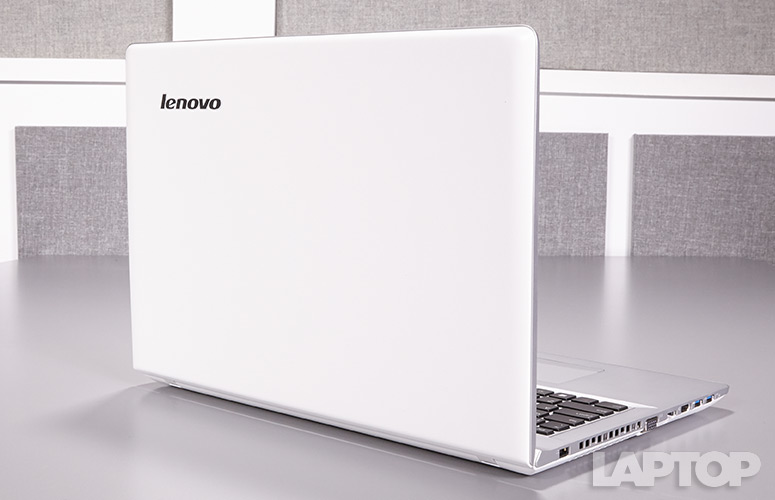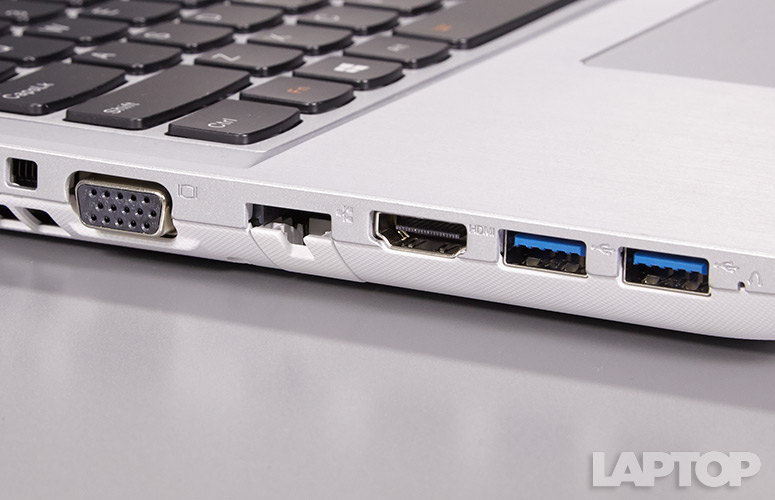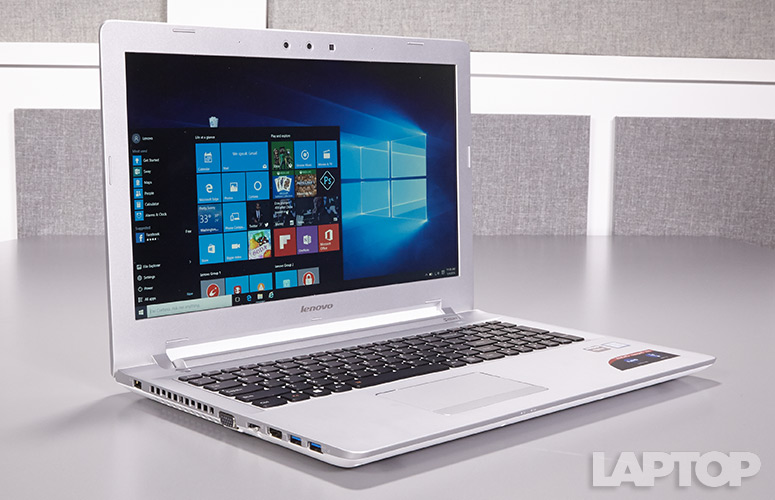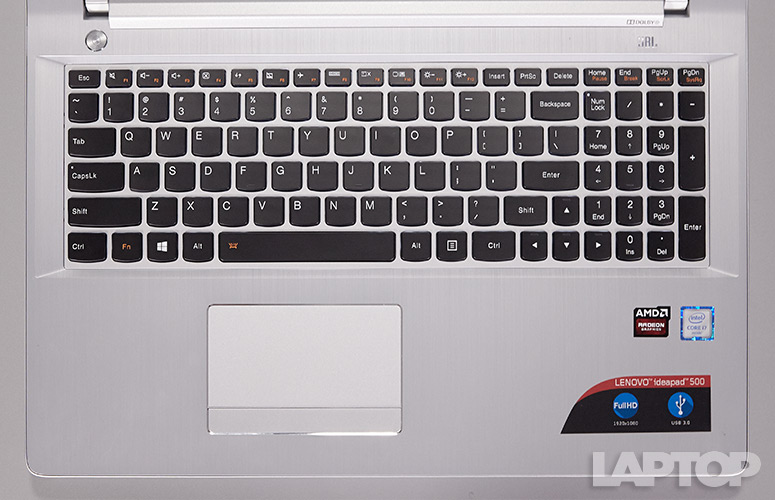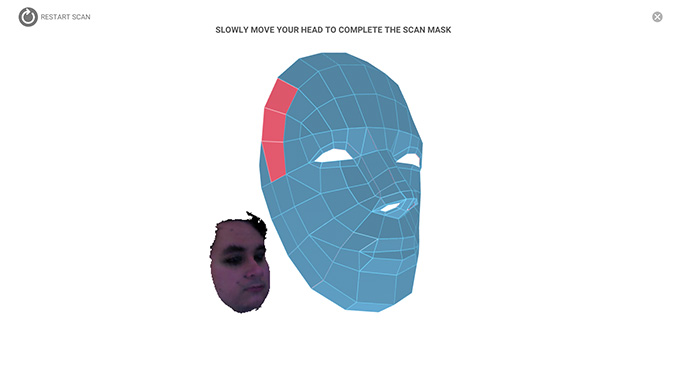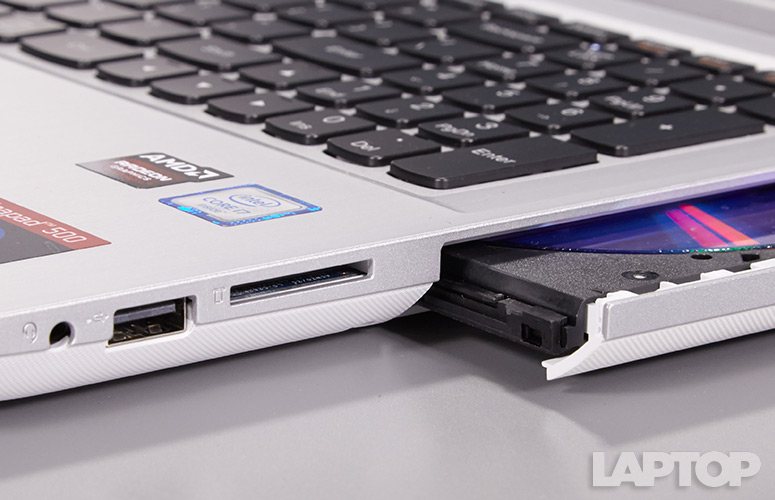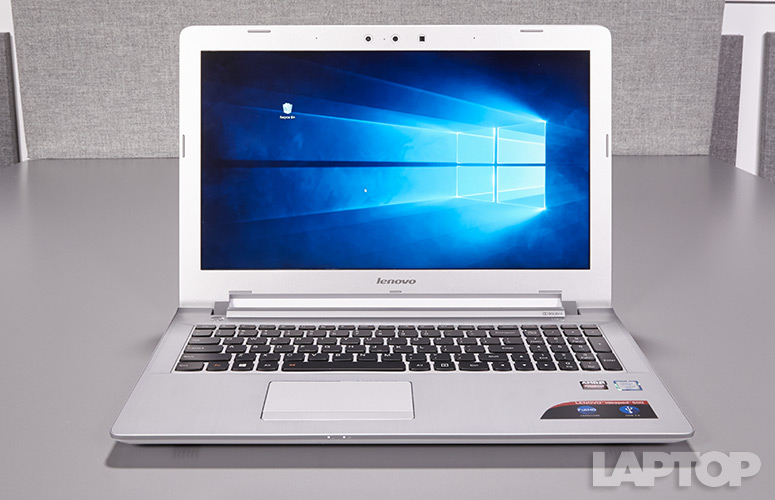Laptop Mag Verdict
The Ideapad 500 is a solid laptop for media consumption and work, but competitors offer better performance and battery life.
Pros
- +
Solid multitasking performance
- +
Great keyboard
- +
Intel RealSense camera
- +
Powerful audio
Cons
- -
Short battery life
- -
Slow hard drive
- -
Mediocre gaming performance
Why you can trust Laptop Mag
Designed for media consumption and productivity over portability, the 15.6-inch Lenovo Ideapad 500 (starting at $500, reviewed at $900) features a 6th Generation Intel Core i7 processor, a 15.6-inch 1080p display and a discrete AMD graphics card. Lenovo's even given this notebook a few features that we don't see on many consumer laptops these days, such as an Ethernet port, a DVD-RW drive and an Intel RealSense 3D camera. While the Ideapad has enough performance for multitasking and casual gaming, similarly priced competitors offer better performance, longer battery life and more-colorful displays.
Design
White with silver accents, the Ideapad 500 stands out from the dour sea of black or silver notebooks. The keyboard deck has a solid feel, with no bending or creaking when I leaned against it. Even though the lid is white, it still picked up fingerprints after only a day of testing.
Measuring 0.97 inches thick and weighing 5.2 pounds, the Ideapad 500 is thicker and heavier than the Toshiba Satellite Radius 15 P55W (0.79 inches, 4.96 pounds), while being lighter and about as thick as the Dell Inspiron 15 7000 (1 inch, 5.9 pounds). It's about as thick and just as heavy as the HP 15t Touch (0.96 inches, 5.2 pounds).
The Ideapad's VGA, Ethernet, HDMI and dual USB 3.0 ports sit on the machine's left side. On the notebook's right edge, you'll find its Kensington lock port, DVD-RW drive, SD memory reader, USB 2.0 port and headphone jack.
Display
When I watched the 1080p trailer for Deadpool on the Ideapad 500's 15.6-inch, 1920 x 1080-pixel display, I found the screen's colors washed out and muted, though details came through clearly. Deadpool's red costume didn't look as vibrant as it does on more accurate displays, but instead was rendered with a more purpleish tone.
Sign up to receive The Snapshot, a free special dispatch from Laptop Mag, in your inbox.
The shadowy corners of a makeshift hospital lacked the inky, saturated tones seen on other displays, and the flames inside a burning warehouse were brighter and whiter than they were orange or yellow. Still, the display is of high enough resolution that I noticed minute details, like the worn-thin pattern on Deadpool's tights.
According to our measurements, the Ideapad's display produces 216 nits of brightness. That's brighter than the HP 15t Touch (162 nits) but dimmer than the Satellite Radius 15 (263 nits), the average mainstream notebook (249 nits) and the Inspiron 15 (222 nits). Making matters worse, the screen's colors started washing out when I moved more than 40 degrees to the left or right.
The Ideapad's display is also less color-accurate than those of its competitors, with a Delta-E score of 4.6 (a score of 0 is perfect). That may beat the average for mainstream notebook displays (5.7), but the Satellite Radius (0.8), HP 15t Touch (3.91) and Inspiron 15 (0.4) all fared better.
Unfortunately, the Ideapad 500's screen just can't show that many colors. According to our colorimeter, the panel renders only 61 percent of the sRGB color spectrum, less than the Inspiron 15 (70 percent) and far below both the Satellite Radius (109.6 percent) and the average mainstream laptop (84.4 percent). The HP 15t Touch (61.5 percent) displays a similarly narrow range of color.
Audio
The Ideapad 500's powerful JBL speakers did a phenomenal job of blasting tunes, filling a large conference room with sound, but the notebook's default sound settings are not optimal. Both the live performance of "Under Pressure," by Queen and David Bowie, and "I Move the Base," by Future, sounded muffled and muddied when the Dolby Home Theater app had its default Music setting enabled. When I changed the preset to Dynamic, Future's bass was strong, David Bowie's voice was clear and powerful, and the dialogue in the Deadpool trailer came out clearer.
Keyboard and Touchpad
Thanks to the Ideapad 500's bouncy, responsive keys, I cranked out 69 words per minute with 97 percent accuracy on the 10FastFingers.com typing test, which is close to my average rates (69 wpm with 99 percent accuracy).
The Ideapad's keys have a solid 1.65 millimeters of travel and require a strong 62 grams of force to actuate. We hope to find between 1.5 and 2mm of travel in notebook keyboards.
The Ideapad's touchpad is a speedy and accurate joy to use. As I traced my finger around the touchpad in fast and wild movements, it kept pace with my gestures. The touchpad also accurately registered two-finger gestures, including scrolling, pinching and zooming.
RealSense Webcam
The camera inside the Ideapad features Intel's RealSense 3D technology, though the notebook did not come with any compatible applications. To test this feature out, I had to find the RealSense app store, and discover programs there.
I chose 3DMe, which takes a number of photos of your face from different angles, and then maps your face onto a digital statue.
The results looked OK, if not a bit close to the uncanny valley, and it failed to capture my hair, instead fitting a digital wig to my virtual skull.
I also tested out the Personify app, which removes your background from your webcam recordings. Personify didn't do a perfect job of facial recognition, lopping off parts of my hair and glasses at times, but it did remove the office wall behind me.
When used as a traditional webcam, the Ideapad's 2MP camera captured noisy, yet color-accurate photos where the purple of my dress shirt and the red of the Purch Media wall looked true to life.
Heat
Throughout my testing, the Ideapad's chassis stayed cool to the touch. After I streamed full-screen HD video from Hulu, the touchpad measured 82.5 degrees Fahrenheit. The space between the G and H keys registered 81.5 degrees, and we recorded a temperature of 86 degrees on the notebook's underside. All measurements are below our 95-degree threshold for comfort.
Performance
Powered by a 6th Generation Intel Core i7-6500U processor with 8GB of RAM and AMD Radeon R7 discrete graphics, the Ideapad doesn't beat all of its competitors, but it has enough muscle for serious multitasking and casual gaming.
I experienced zero lag or stutter while I split my screen between Google Chrome (with 12 tabs open), the processor-intensive racing game Asphalt 8 and the note-taking app Google Keep.
On GeekBench 3, which measures overall performance, the Ideapad scored 6,128, which beats the Core i3-4005U-powered HP 15t Touch (3,420) and Core i5-5200U-powered Satellite Radius (5,489). However, that score is below those of the Core i5-6300HQ-powered Inspiron 15 (8,800) and average mainstream laptop (8,936).
MORE: Best Lenovo Laptops
We measure a hard drive's speed by timing how fast it can duplicate 4.97GB of multimedia files, and the Ideapad's 1TB, 5,400rpm hard drive completed this task in 2 minutes and 42 seconds, for a rate of 31.42MBps. That's faster than the 750GB, 5,400rpm drive in the 15t Touch (25.6MBps), but slower than the 1TB, 5,400rpm hard drive in the Inspiron 15 (34.62MBps) and the 750GB, 5,400rpm hard drive in the Satellite Radius (39.15 MBps).
The Ideapad also achieved a middle-of-the-pack result in the OpenOffice Spreadsheet Macro test, where it matched 20,000 names and addresses in 4 minutes and 4 seconds. That time is shorter than those of the HP 15t Touch (7:59), Satellite Radius (5:42) and average notebook (5:20), but slightly longer than the Inspiron 15's time (3:58).
Graphics
With the power of an AMD Radeon R7 graphics chip, the Ideapad 500 is good for casual-to-regular gamers. The notebook notched a score of 76,761 on the 3DMark Ice Storm Unlimited gaming benchmark, which is greater than the average notebook (73,478), HP 15t Touch (31,921) and the Satellite Radius (55,355). The Inspiron 15 7000 (105,046) earned a higher score.
MORE: The Best Gaming Laptops
When I played the Asphalt 8 racing title on the Ideapad, the game ran smoothly and without stutter, but it couldn't come close to our 30 frames per second threshold for BioShock: Infinite (11.9 fps at 1080p and Low graphics) or Metro: Last Light (15 fps at 1080p and Low graphics). The Inspiron 15 7000, which has an Nvidia GeForce GTX 960M GPU, ran Bioshock (88 fps) and Metro: Last Light (58 fps) at playable speeds at the same settings.
Battery Life
Don't expect to carry the Ideapad 500 too far from an outlet. On the Laptop Battery Test, which involves continuous surfing over Wi-Fi at 100 nits, Lenovo's laptop lasted a mere 3 hours and 43 minutes. That's a shorter than the Inspiron 15 (6:45), HP 15t Touch (5:24), Satellite Radius (5:14) and average laptop (5:50). If you turn the brightness up all the way or play games rather than just surf the Web on the Ideapad 500, expect its time to be much lower.
MORE: Laptops with the Longest Battery Life
Software and Warranty
The Ideapad's preloaded software includes the proprietary Lenovo Companion app for system maintenance, updates and support; OneKey Recovery for system backup management; and the ReachIt Bring-Your-Own-Cloud file-organization app. The company also included its own Settings app, which wrangles in a commonly used group of option toggles from Windows 10's settings. SHAREit lets you transfer files between your Ideapad and smartphones running iOS, Android or Windows Phone.
Lenovo includes a one-year warranty with 24/7 phone support and free parts and labor for mail-in repairs.
Configuration Options
The entry-level, black $450 Ideapad 500 has a 2.3-GHz 6th Generation Intel Core i3-6100U processor, integrated Intel HD graphics, 6GB of RAM and a 5400rpm 500GB hard drive. If you want more performance, Lenovo sells that same Ideapad with a 2.3GHz Intel Core i5-6200U processor for either $550 (white) or $600 (black).
An $800 model of the Ideapad 5000 has a 2.5-GHz 6th Generation Intel Core i7-6500U processor, 8GB of RAM, integrated Intel HD graphics and a 5400rpm 1TB hard drive. The model we reviewed costs $900 and has a 2.5GHz 6th Generation Intel Core i7-6500U processor, 8GB of RAM, an Intel RealSense Camera, an AMD Radeon R7 graphics card with 2GB of memory and a 5400rpm 1TB hard drive.
Bottom Line
The Lenovo Ideapad 500 has enough performance for solid multitasking; a great, responsive keyboard to enable your productivity; and Intel RealSense, which offers a few interesting capabilities now, with more possible in the future.
While its display and hard drive speeds aren't ideal, the Ideapad 500's biggest drawback is its short battery life, which detracts from the machine's portability.
- More on Laptops
- Best 2-in-1s (Laptop/Tablet Hybrids)
- 10 Tablets with the Longest Battery Life
- Best Chromebooks Available Now
Lenovo IdeaPad 500 Specs
| Bluetooth | Bluetooth 4.0 |
| Brand | Lenovo |
| CPU | 2.5GHz 6th Generation Intel Core i7-6500U Processor |
| Card Slots | SD memory reader |
| Display Size | 15.6 |
| Graphics Card | AMD Radeon R7 M360 |
| Hard Drive Size | 1 TB |
| Hard Drive Speed | 5,400rpm |
| Native Resolution | 1920x1080 |
| Operating System | Windows 10 Home |
| Optical Drive | DVD RW |
| Ports (excluding USB) | Proprietary, USB 2.0, USB 3.0, Ethernet, VGA, HDMI, Headphone, Kensington Lock |
| RAM | 8GB |
| Size | 15.12 x 10.43 x 0.97 inches |
| Touchpad Size | 4 x 2.6 |
| Video Memory | 2GB |
| Weight | 5.2 pounds |
| Wi-Fi | 802.11ac |
| Wi-Fi Model | Lenovo AC Wireless |
Henry was a contributing writer at Laptop Mag. He penned hundreds of articles, including helpful how-tos for Windows, Mac, and Gmail. Henry has also written about some of the best Chromebooks, and he has reviewed many Apple devices, including various MacBook Air laptops. He is now a managing editor at our sister site Tom's Guide, covering streaming media, laptops, and all things Apple.
